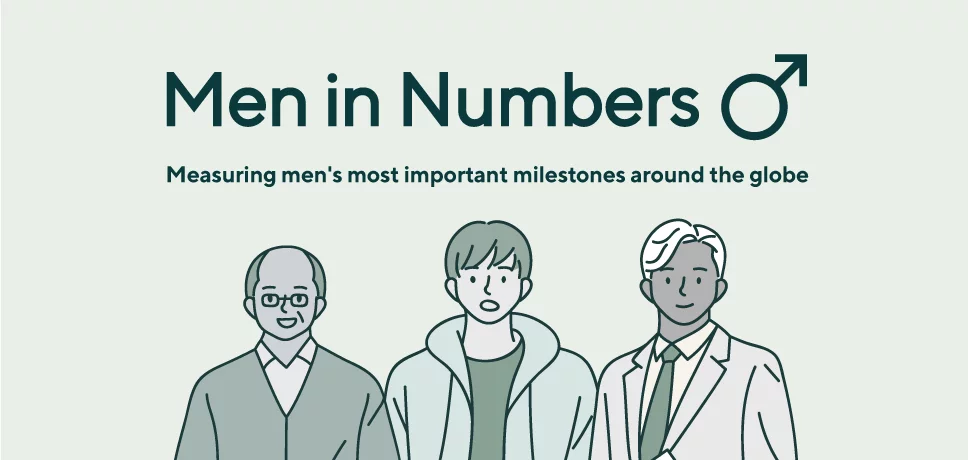
There are many events throughout a man’s life that are important, from their first sexual encounter to retirement. All of these are important markers, although how significant each one is is entirely subjective, and can be impacted by other factors, including age, environment, and culture.
Our researchers have collected data from a number of authoritative sources* to discover the average age that men hit some of the most significant events throughout their lifetime, with a total of 35 countries being compared across the globe.
From losing their virginity (or losing their hair) to the average retirement age and more; all major milestones that men experience throughout their lifetime have been covered. But how do men, and their important moments, compare against each other around the world?
What’s Your Number? How Many People Have Men Around The World Sleep With?
The number of sexual partners differs from country to country. Our research shows that the average number of sexual partners for men is 9.3 throughout their lifetime.
Turkey takes the title as the country with the most sexual partners, with men having on average 14.5 sexual partners in their lifetime, four times higher than the average of the lowest country; India. This is followed by Australia, with Australian men having on average 13.3 sexual partners. New Zealand takes third place with 13.2.
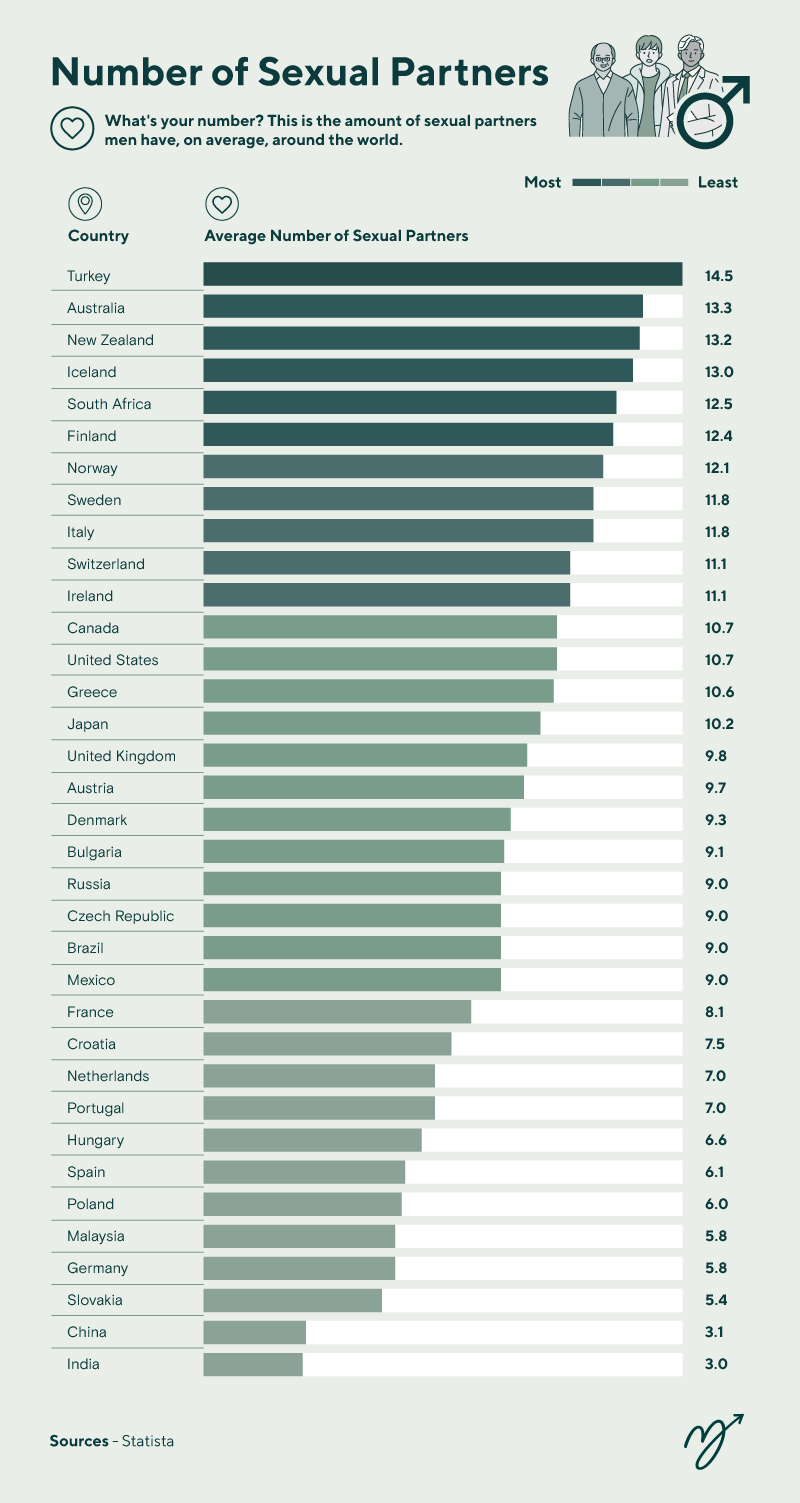
The United States sits in the middle, with men in the US having, on average, 10.7 sexual partners in their lifetime, slightly above average. The UK also falls marginally above average, with 9.8 partners.
As we’ve seen, the country with the lowest number of sexual partners is India, with three. China has the second-lowest number of sexual partners for men, with 3.1, with Slovakia, being the lowest European country, and third-lowest worldwide with 5.4.
Dr Earim Chaudry, Medical Director of Manual, said: “While people in some countries prove to have more sexual partners than others, it is important not to compare yourself to these figures.
“Safe, consensual sex should always also be practised, and the number of sexual partners does not correlate with a man’s level of satisfaction with their sex life.
Losing It: What Age Do Men Lose Their Virginity, Globally?
The first time a man has sex is often regarded as a significant experience. The average age men lose their virginity across the globe is 17.3 years, but this differs greatly from country to country.
Out of the 35 countries examined in our research, Iceland has the lowest average age for males losing their virginity, at 15.6 years. This is due to liberal laws in the country regarding sex, with the age of consent in Iceland being 15.
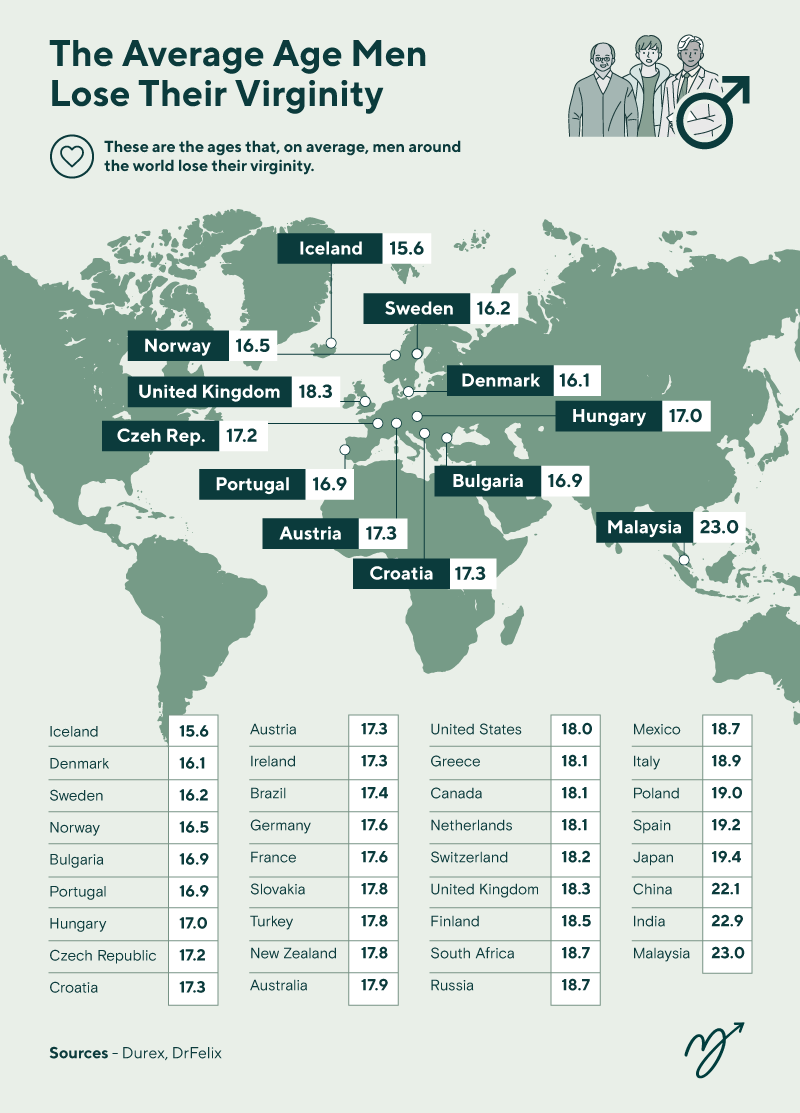
Denmark has the second-lowest average age of virginity loss for men, at 16.1 years. Their Scandinavian neighbours, Sweden and Norway, also have some of the lowest averages, at 16.2 and 16.5 years respectively.
On the other end of the scale, the country with the highest age for virginity loss for men is Malaysia, with an average age of 23 years, six years higher than the global average of 17.
The average age of virginity loss for men is also notably higher in Asian countries, with the second-highest, India, being 22.9 years of age. China and Japan take third and fourth spot, at 22.1 years and 19.4 years.
The UK falls slightly above the global average, at 18.3 years, while the USA is slightly below at 18 years.
Dr Earim Chaudry notes: “Our research shows that the age men lose their virginity can differ around the world. In places with what could be thought of as a more liberal view on sex, including many European countries, we can see that the average age is lower.
“While we can see differences in countries, it is important to remember that men from all over the world should only have sex when they feel ready.”
Saying ‘I do’: At What Age Do Men Get Married Around The World?
The wedding day is said to be one of the happiest days for men worldwide. It symbolises new beginnings and commitment to a partner.
The age at which men get married has changed over the years. Back in Shakespearean times, the average age for a man to marry was 20.6 years, 12 years younger than the average age today, 32.3.
While some countries still see a pattern of men marrying young, others are seeing grooms getting hitched much later in life.
Out of the 35 countries examined in our data, India currently holds the title for the youngest average age for a man to make his wedding vows, at 26 years.
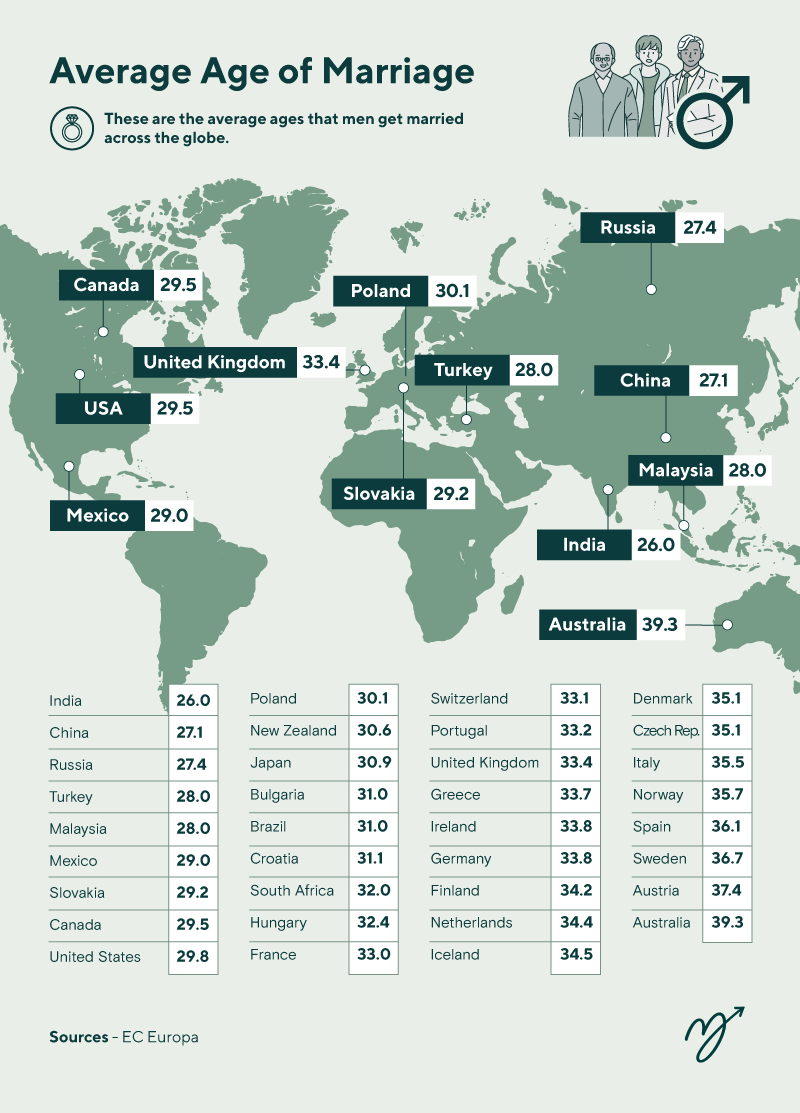
China sees the second youngest grooms, with the average age for a man to marry being 27.1 years, with Russia taking third place at 27.4 years.
The US also falls lower than the global average, with men marrying at 29.8 years, however, the US currently has the third-highest divorce rates in the world, only behind Maldives and Belarus.
The country with the oldest grooms is Australia, with an average age of 39.3 years. Austria takes second place, at 37.4 years, with Sweden in third at 36.7.
Grooms in the UK get married slightly above the global average, with men marrying at 33.4 years old on average.
Globally, men tend to wait just over 14 years (14.14) on average between losing their virginity, and getting married. In India, men wait for an average of just three years from their first sexual encounter until they get married although, as we’ve seen, the country has the second-highest virginity age, but the youngest marital age.
Men in Australia wait the longest between losing their virginity and getting married – over 21 years. Sweden (20.4 years) and Austria (20.1 years) also average over two decades between the first time men have sex, and when they tie the knot. In the UK, the average time between a man losing his virginity and getting married is 15 years.
Although we know that not all marriages last the distance, we do know that men around the world, on average, live for over 44 years (44.54) after marriage. In South Africa, this drops to just 28.7 years on average – largely owing to men marrying later (32 years old, on average), and the relatively low age of mortality there (60.7 years).
Men in both Canada and Japan have, on average, the longest time between getting married and dying – just over 50 years (50.5). In the UK, there is a 46-year gap between men getting married, and them dying.
Dr Earim Chaudry said: “Marriage is a symbol of love towards a partner, an important life event that many men remember for the rest of their lives.
“In many countries, we are seeing more and more men marrying in later stages of their life, which may be due to social pressures and priorities changing, especially amongst Western countries.
“Again, there is no perfect age to get married, and men should only do so once they feel ready for the commitment.”
Paternity Permitted: How Much Time Do New Dads Get Around The World?
Having children is another milestone that most men achieve in their lifetime, with 130 million babies born each year worldwide. Many regard the birth or adoption of a child as one of the most memorable days in their life.
However, while dads in some countries receive paid paternity leave to spend time with their newborns, others miss out.
Men in Russia, Slovakia and the United States are currently not entitled to any paid paternity leave, standing at zero days.
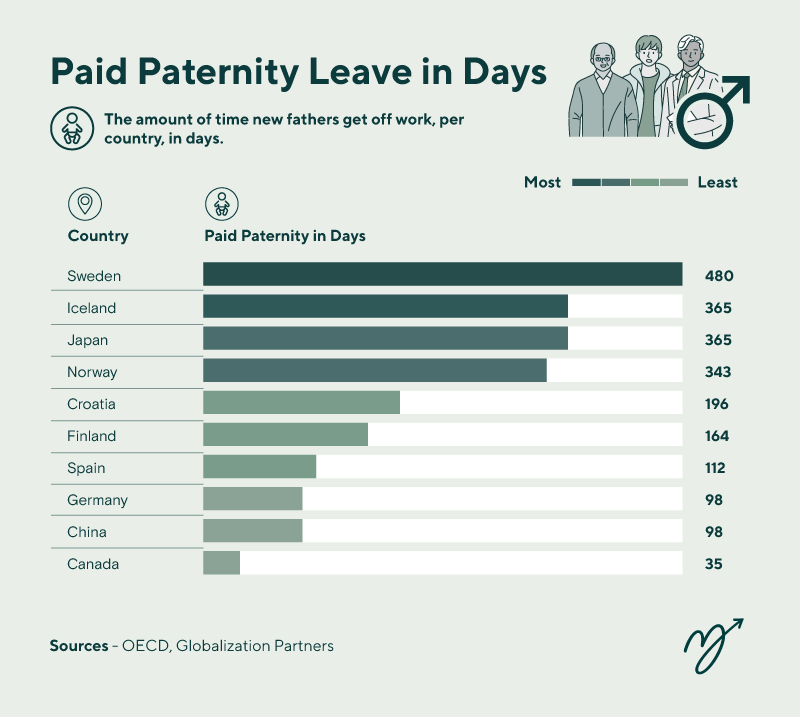
Turkey sees the second-lowest paid paternity leave for men in our research, with three days in total, with Mexico, Brazil and Hungary at five days each.
However, some countries allow more generous periods of paternity leave for new dads. Within our research, the country with the longest paid paternity leave is Sweden, with 480 days – roughly a full year and a quarter, however, this is at 80% of their salary.
Japan and Iceland tie for second place, with 365 days, or a whole year off in total, at 58.4% of their salary, while Norway allows 343 days, at 100% or 413 days at 80%.
The UK currently allows two weeks of paid paternity leave, similar to eight other countries that also allow this, including Australia, Denmark and New Zealand.
Earim Chaudry said: “Some countries are lucky enough to have longer paid paternity laws than others. However, we anticipate many countries to improve their paternity laws in future years.
“This is due to social attitudes regarding parenting changing in many countries, particularly in Western countries. Men are playing much more active roles in parenting compared to 50 or 100 years ago.
“It’s also viewed as a progressive step in reducing discrimination against women in the workplace, if new parents are granted more equal periods of paid paternity and maternity leave.
“Some countries are already recognising this, and allowing both men and women equal opportunities to paid leave after the birth or adoption of a child, and we expect to see more countries follow.
“Postnatal depression (PND) can also be found in men. New research in Sweden found that 28% of new fathers had symptoms that scored above mild levels of depression. Extra responsibilities, financial worries and relationship stress can contribute to new fathers showing signs of depression. We can expect governments to change their paternity laws as more research is done into male PND.”
Clocking Off: What Age Do Men Around The World Retire?
Retirement age is another milestone that differs from country to country. In some countries, men can enjoy a younger retirement age, while in others, men have to work longer, with the global average of 64.2 years.
Five countries currently have the youngest retirement age for men, at 60 years. These are Malaysia, Turkey, South Africa, India and China.
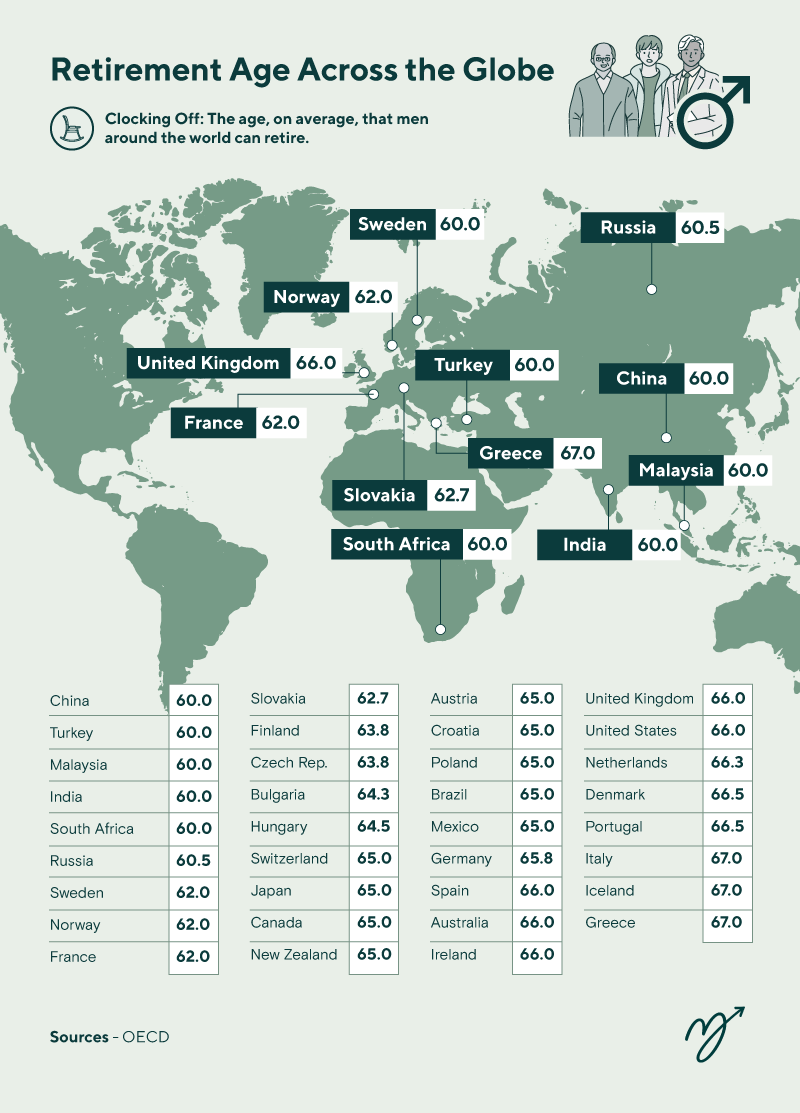
Three countries tie with the longest retirement age for men. At seven years higher than the youngest, men in Italy, Greece and Iceland have to work until they are 67 years old.
Men in the UK, USA, Australia, Ireland and Spain all have to work until they’re 66 years old.
However, with life expectancy continuing to rise globally, the average retirement age is due to rise globally, as better healthcare means people are living longer.
On average, men around the world live for just under 13 years (12.67 years) after retirement. In South Africa, that number drops dramatically, to under a year (0.7 years). However, in France, men enjoy an average of 17.7 years after retirement, before they pass away. Men in Sweden (19.3 years) and Norway (19.2 years) also enjoy long retirements. The UK sits just above the global average, with men living for a further 13.4 years after they retire.
Dr Earim Chaudry comments: “Retirement age is another life event that differs from country to country. However, this can be expected to change in future years, as retirement age can be expected to rise across the majority of countries, as men stay healthier for longer.
“More exercise and healthier diets – low in processed red meats – mean that men in many countries are living beyond that of their parents and grandparents. Health improvements, including more knowledge of cancers, such as prostate, or testicular, mean that men are being diagnosed earlier meaning the condition can be treated more effectively.”
The End? What Is The Mortality Rate For Men Around The World?
According to our research, the average life expectancy for men out of the 35 countries in our sample is 76.8 years of age. However, this number also differs from country to country. Generally, in more developed countries the average life expectancy for men seems to be higher, with better diet and healthcare contributing to this.
Out of the 35 countries used in our data, the country with the highest life expectancy for men is Switzerland, at 81.9 years, five years higher than our average. Japan, a country known for its healthy diet, takes second place, with men living on average until 81.4 years of age, while Sweden takes third at 81.3.
The UK sits slightly above the average global mortality rate, at 79.4 years.
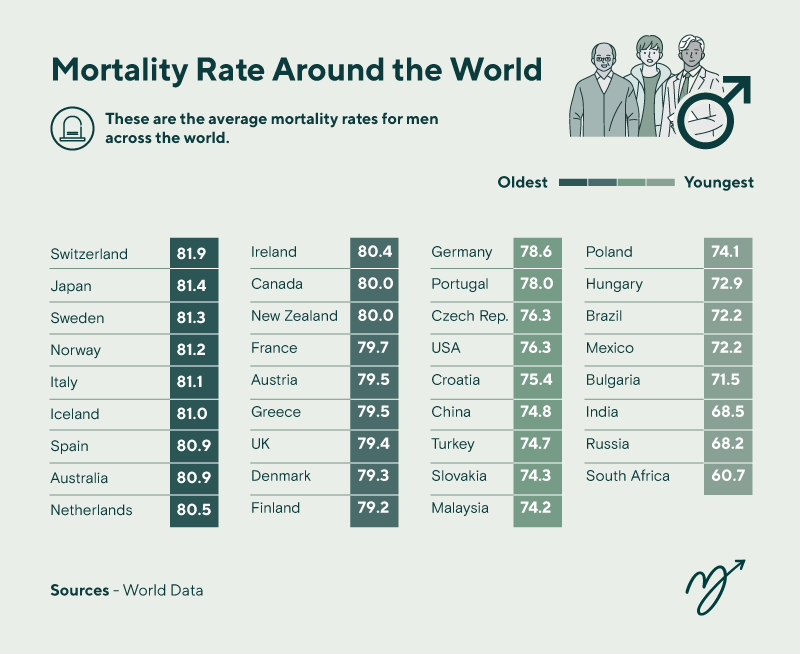
Out of our 35 countries, men in South Africa currently have the shortest life expectancy, at 60.7 years. Russia takes second place at 68.2 years, with India in third place at 68.5 years.
Dr Earim Chaudry said: “Male life expectancy differs widely across countries. Many western countries tend to have a higher life expectancy, as better health care and diets are more widely recognised.
“Some countries, however, still have a lower life expectancy than the global average. This can be due to a number of reasons, such as health factors or even crime rates.
“Heart disease, the leading cause of death for men worldwide, is also higher in men in countries with a lower average life expectancy. Countries like South Africa show higher rates of heart disease, compared to that of Switzerland or Japan.”
Conclusion: What Do These Male Milestones Really Mean?
Dr Earim Chaudry, Medical Director at Manual said: “Our research has shown that across the world, milestones for men differ from country to country. The age at which men achieve these important moments can be impacted by external factors including, but not exclusive to, age, day-to-day health, environment, culture, and even libido.
“For some men, certain events will feel like they can’t come quickly enough, whereas others moments in life are markers they want to put off for as long as possible. The reality is that these occasions may be important, but they’re also entirely unique to each individual.
“While these statistics highlight the average age of these occasions, it is important for men not to compare themselves to these figures, as many events will occur when the moment is right, or happen naturally.
“Making sure to lead a healthy life is the most important thing, which includes regular checkups with your GP, and eating a good, balanced diet.”
Methodology
*We created a seed list of 35 countries from around the world that would provide us with a mixture of results that we could then compare.
We used a range of different data sets for each important events, and combined this together when contracting the results.
While we've ensured that everything you read on the Health Centre is medically reviewed and approved, information presented here is not intended to be a substitute for professional medical advice, diagnosis, or treatment. It should never be relied upon for specific medical advice. If you have any questions or concerns, please talk to your doctor.




